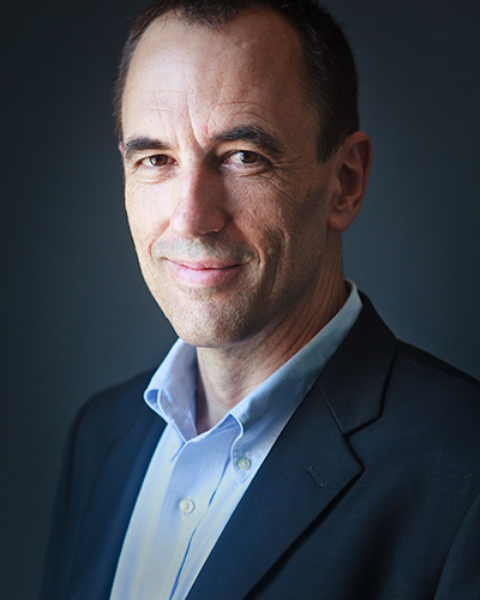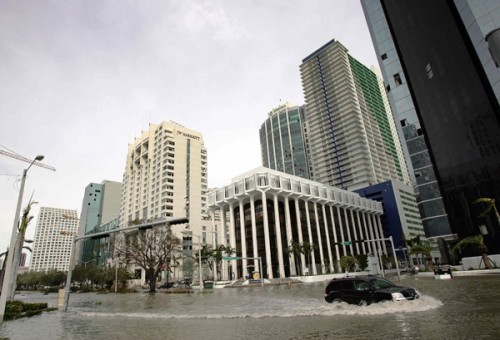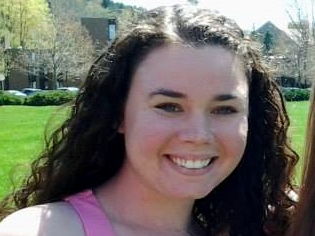The Lost City of Miami
By: Terence Duvall, MS ’15, and Molly Gilligan, MS ’15

We are currently experiencing a slow-motion catastrophe. The die is cast. We have emitted enough carbon into the atmosphere to guarantee climate change and rising sea levels. Some of our most precious real estate, our commercial capitals, and our destination beaches, are doomed.
And yet, instead of proactively considering possible solutions, from abstaining from building on fragile coastlines to moving inland, the response of many is to deny that they are or will ever experience the impacts of climate change in the city they call home. This is despite the fact that already we are beginning to see the effects of climate change in many coastal cities within the United States and worldwide. Why then, is there still such a disconnect between science and societal beliefs? How can this gap be closed?
The Role of Journalism in the Climate Change Discussion
There are some who claim that climate change is the result of a political conspiracy. Often these detractors harp on minutiae of broad scientific reports, relying on science’s inability to posit anything with 100% confidence. Then they raise an alarm to discredit the clear and compelling arguments for responsible action to climate change. It is up to journalists to investigate the fact of the matter and disseminate a rational view.
Author and Contributing Editor to Rolling Stone magazine Jeff Goodell is one of those investigative journalists. He recently joined the Bard Center for Environmental Policy National Climate Seminar to discuss his inspiration for writing the Rolling Stone article, ‘Goodbye Miami’. Goodell reports that within a century Miami and South Florida’s famous beaches will be inundated by the sea’s rise, but within the next decades the impacts of climate change will eliminate the opportunities of a vibrant society in Miami. We spoke to Goodell about South Florida’s fight to keep itself above water and asked him about his role as a journalist in the climate change discussion.

Goodell, who has led a diverse career in journalism, has recently focused on climate issues. The pressing nature of climate change, and the broad scope of its consequences, make it a story which applies to all readers. As a writer, Goodell enjoys the challenge of taking the abstract ideas that compose the climate change debate and using them to create a vivid story that makes hard science explicable to non-scientists. A forum such as Rolling Stone magazine provides Goodell with the opportunity to reach an audience which might not otherwise be exposed to articles about climate change issues.
Following 2012 Superstorm Sandy, Goodell found himself reflecting on New York City’s vulnerability to the effects of global warming. He was not the only one. The impact from Sandy could have been even worse if Mayor Bloomberg, city workers, and policy makers had not been hard at work for close to a decade thinking of solutions to save their city with PlanNYC. Through conversations about New York City, Goodell became intrigued in the future of other cities, specifically the extent to which Miami’s leaders are not facing up to the challenge of adapting to or mitigating the effects of climate change.
South Florida: Can We Save Miami?
Goodell travelled to South Florida, where climate change is already wreaking economic havoc and logistical nightmares on the city of Miami. He notes that high tides bubble up from sewers and flood the streets of Miami Beach. Salt water is threatening the remaining fresh water supply in the Biscayne aquifer. The low lying land is no longer considered insurable against hurricanes by major insurance companies, so the state is on the hook for billions of dollars of property in the event of another extreme weather event.

South Florida’s geology precludes some of the adaptation strategies practiced by other endangered cities. It is low above sea level and built on permeable limestone bedrock, which make it a poor candidate for any structure that can act as a barricade for salt water intrusion. Engineering of hard structures, like dikes, or soft structures, including increased vegetative coastal protection, are also challenging because the salt water is coming from the east from the Atlantic Ocean as well as from the west through the Everglades. As the sea levels rise, the water will find its way over, under, or around whatever dikes or sea walls are constructed.
Policy Implications
The best available technology is not measuring up to effective and efficient solutions for South Florida either. Goodell notes that a $6 billion desalination treatment facility would only provide one third of the water needed by the region. Raising buildings off the ground will not protect the wiring and drinking water being ruined by saltwater incursion.
South Florida’s energy production poses a problem, as well, in the face of the rising ocean given the location and design of the Turkey Point nuclear power plant which is exposed to storm surges and hurricane forces. Although the reactors themselves are elevated in an attempt to withstand hurricanes, some of the essential safety components, like the emergency diesel generator, were not designed to withstand extreme storm events. With the projected sea level rise of three feet, Turkey Point will be completely isolated from the mainland within the next century. Even still, Florida is considering building two more nuclear reactors on Turkey Point!
Determining which mitigation or adaptation policies and technologies would be the most effective in South Florida is a challenging feat, but one that needs to be addressed with urgency. In spite of this, politicians have decided to ignore reason and go about business as usual. During the National Climate Seminar, Goodell spoke of the political forces, including the current Republican governor of Florida and the strength of the tea party in South Florida, which are perpetuating a climate denier standpoint and are actively halting the necessary conversations, decisions, and progress which could save their state.
Businesses, scientists, engineers, policy-makers, and journalists must work together to convince Florida’s elected officials to face the facts: we need new solutions, otherwise it’s time we start saying goodbye to Miami.


To listen to this and other National Climate Seminars, click here.

